American legacy automaker Ford has just restarted the development of its new electric vehicle battery factory in Michigan after a two-month delay due to the United Auto Workers union strike, AP News reported.
“We are now good to confirm that we are moving forward with the plant.”
Ford Spokesman Mark Truby told reporters
Notably, the BlueOval Battery Park in Marshall is part of Ford’s decision to delay its planned electrification investments of about $12 billion.
Original plan
According to The Verge, Ford initially announced the BlueOval Battery Park project in Marshall, Michigan, in February.
At that time, Ford originally pledged to invest about $3.5 billion in the battery factory development, potentially generating 2,500 new jobs.
The annual battery cell production was also originally set to support the production of 400,000 electric cars.
“While we remain bullish on our long-term strategy for electric vehicles, we are re-timing and resizing some investments. As stated previously, we have been evaluating BlueOval Battery Park Michigan in Marshall.”
Ford (via TechCrunch)
Ford halted the project development in late September amid the United Auto Workers union strike on some of its assembly facilities. Notably, American automaker General Motors and Jeep maker Stellantis were also affected by the strikes. Finally, the contract dispute concluded last week as all factory workers voted to negotiate new deals.
Ford scales back original plan
Several electric automakers have already scaled back their production schedules and plans due to various factors, including high labor costs, price wars, and waning demand.
For instance, Ford decided to diminish its plans for the BlueOval Battery Park. Instead of allocating the initially announced $3.5 billion investment, the company will now just allot about $2 billion.
In addition, the expected number of new job generation at the new battery factory dropped by around one-third to 1,700.
The company also reduced its planned annual battery cell production capacity by about 43% to 20 GWh, just enough to support 230,000 electric vehicles.
Despite the plan adjustments, Ford maintained the timeline for the factory’s official opening in 2026. It will manufacture lithium-iron-phosphate (LFP) batteries with its partner, CATL. The battery tech’s affordability compared to the current nickel-cobalt-manganese chemistry can potentially boost Ford’s electrification efforts.






